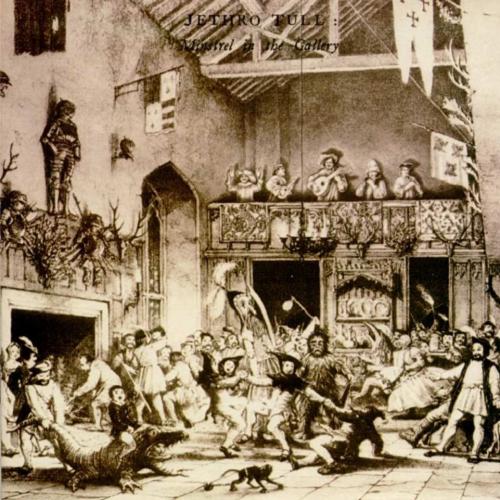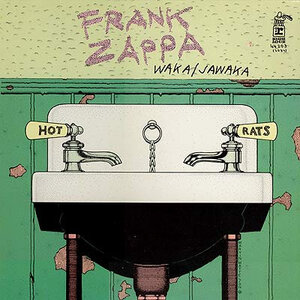Minstrel in the Gallery is the final album by the classic lineup of Jethro Tull. With Ian Anderson on vocals/flue, Martin Barre on guitar, Jefferey Hammond Hammond on bass, Barrimore Barlow on drums and John Evans on keys, the group set out to keep on keeping on. This album is more of that same classic mix of prog rock, hard rock, and folk rock.
This record, Tull's 8th, has some of their hardest, sharpest material yet. It's a pseudo-concept album, with a "band of traveling minstrels" being introduced to "a lord and lady" and then playing some songs. One would think this would lend itself to Tull's folksy side, but Minstrel in the Gallery is surprisingly heavy. Of the Tull record's I've heard, this one has by far the most guitar dominance. Usually, Barre seemed to be ore a complementary player for Anderson's words and flute, but here, the guitar is at the forefront. The pastoral passages are kept to a minimum, and there's lots of stuff on here that would not be that out of place on a Led Zeppelin album. This is not a bad thing at all. I appreciate Jethro Tull taking on new ground and evolving their sound while not at all turning their back on prog. Highlights of this album include the title track, which has quite cold yet surprisingly human lyrical themes about performance art and service (disillusion with touring was a big inspiration for Anderson's work on this record), "Black Satin Dancer", which builds immense tension through interplay between guitar, bass, and flute much like a ballet, and the nearly side long "Baker Street Muse", which is sort of like a mini-version of Thick as a Brick or A Passion Play.
This album took me a little bit of time to warm up to as the great stuff about it is not as obvious and show-stopping as that of other great Tull records. Yet, given repeated listens, Minstrel in the Gallery has moved up in my estimation. This is a great record, the keystone in the long career of Jethro Tull as they transitioned from prog-folk to hard-prog and chock full of musical merit.
Grade: B+
Sunday, June 2, 2013
Sunday, May 26, 2013
Ashra- New Age of Earth (1977)
Ashra, a late 70's German Progressive-electronic outfit, evolved from the Krautrock group Ash Ra Temple. New Age of Earth marks their debut effort. Although it claims to be a collaborative effort, it is in fact a solo effort by Manuel Göttsching, keyboardist and electronic expert who had led Ash Ra Temple (other members would contribute to later Ashra releases). This record sees a plunge into a lighter, fully electronic sound, distant from any Krautrock past.
When I compare this to other prog-electronic releases from the late 70s, (Stratosfear era Tangerine Dream, Klause Schulze), New Age of Earth sounds remarkably bright. This is a very mellotron heavy album, and it generates a sound that evokes floating through nature. The tones are kept warm and fresh, and less of the alienation that is often a hallmark of prog-electronic is present. Even the track titles suggest this intention- "Sunrain", "Ocean of Tenderness", "Deep Distance", and "Nightdust". Everything on this record flows. This can be a bad thing- at times, New Age of Earth does get a little boring as the passages move on without having any aim. However, most of the time, I like the effect. This record is a cohesive experience, that relaxes the listening mind with mellow movements. I have no doubt this album could have influence Brian Eno and the ambient movement which would grow during the 80s.
I give New Age of Earth a thumbs up. It's not ground breaking, but it's solid. The pleasant feel evoked by this album gives me reason to come back to it frequently, and it makes a great, absorbing landscape in which you can easily get lost in.
Grade: B
When I compare this to other prog-electronic releases from the late 70s, (Stratosfear era Tangerine Dream, Klause Schulze), New Age of Earth sounds remarkably bright. This is a very mellotron heavy album, and it generates a sound that evokes floating through nature. The tones are kept warm and fresh, and less of the alienation that is often a hallmark of prog-electronic is present. Even the track titles suggest this intention- "Sunrain", "Ocean of Tenderness", "Deep Distance", and "Nightdust". Everything on this record flows. This can be a bad thing- at times, New Age of Earth does get a little boring as the passages move on without having any aim. However, most of the time, I like the effect. This record is a cohesive experience, that relaxes the listening mind with mellow movements. I have no doubt this album could have influence Brian Eno and the ambient movement which would grow during the 80s.
I give New Age of Earth a thumbs up. It's not ground breaking, but it's solid. The pleasant feel evoked by this album gives me reason to come back to it frequently, and it makes a great, absorbing landscape in which you can easily get lost in.
Grade: B
Thursday, May 23, 2013
Jukebox #8
Today I'm featuring some songs by The Doors, particularly looking for their considerable proto-prog influence. Rest in Peace, Ray Manzarek.
Sunday, May 19, 2013
Progressive Rock- Cracked
I'm very busy finishing up my last finals/fun of my sophomore year of college, so in lieu of a review, this week you get to read Cracked, the online humor site, take on Prog and my comments:
http://www.cracked.com/funny-2359-progressive-rock/
Count Felix's reaction's:
http://www.cracked.com/funny-2359-progressive-rock/
Count Felix's reaction's:
- Spongebob is not an instrument. Horseradish is not an instrument either.
- That Atomic Rooster cover.... yes. I've never seen it in person and I still refuse to believe it exists.
- Always good to put that classic video of Focus anywhere possible. When everyone in the world has seen it, Earth will be a better place.
- Peter Gabriel is not wearing pants there either. Whatever it is, it looks intense.
- Not all classic prog sounds like it was made on drugs. At least, no more so than any other genre of music in the 70s. Disco Duck anyone?
- The Planet of the Dragons is the most derpy bandname ever.
Sunday, May 12, 2013
Pink Floyd- The Dark Side of the Moon (1973)
I'm going to revisit this old classic, which was the second album I reviewed on blog mk. 1. At that time, Dark Side of the Moon was my favorite album of all time. What makes Dark Side of the Moon so magical? It's clearly got an enormous audience of people who love it- 15 years on the billboard chart, and entire factory dedicated to just making this record, a place as the #2 album of all time on my general music rating site of choice (http://rateyourmusic.com). Roger Waters (bass), David Gilmour (Guitar), Richard Wright (Keyboars), and Nick Mason (Drums) had done a lot of good space rock up to this point, but this was something else. It was transcendent. This record was grounded in space rock and psychedelia but had something more.
The genius of Dark Side of the Moon is the atmosphere, the all around feeling it creates. This is a record that immerses this listener in sound. Dark Side is the ultimate headphones record, and it thunders. The perfect balance of emotion, distance, and musical technicality comes together and builds upon itself into a unified work. And what a work it is. "Breathe", "Time", "Us and Them", I probably don't even need to describe them to you. They just pull you along in to a world of existential musing. The more I listen to the record, the less important I think those lyrics- which are great and have plenty of room for interpretation- are not what makes Dark Side special for me. It's that atmosphere- this record feels boundless and unhinged. Some people complain that "Money" interrupts that flow- I just don't see it. It still has the same people making the same sounds, just a little harder. That booming pulse "balances on the biggest wave" and comes through all the same- and this pulse is what ties down the whole thing. In parts, Dark Side of the Moon is fine. As a whole work, it's utterly phenomenal.
I will admit, I don't think this is my favorite album of all time anymore. It's damn close though, and that does not stop me from coming back to Dark Side of the Moon time and again. It's not a record where you find something new every time- after a while, you just keep finding that enveloping atmosphere, and it gets richer and richer with each listen. No prog fan should be without it.
Grade A+
Wednesday, May 8, 2013
Sunday, May 5, 2013
Frank Zappa- Waka/Jawaka (1972)
We're going to take a turn for the weird this week with a dip into the extensive back cataloge of Frank Zappa. Waka/Jawaka fits into a phase of Zappa's career where he was going back and forth between genres and generally trying out whatever he damn well pleased. This album is the second in a trilogy of sorts, all of which are heavily inspired by Jazz. However, upon a listen, Waka/Jawaka really has little in common with Hot Rats (1969), and is more in line with The Grand Wazoo (1972).
If Hot Rats had intensity, aggression, and gusto, Waka/Jawaka is a smooth, polished, and articulate jazz-rock record. The arrangements are much more restrained,with a less wild feel. Smooth jazz is what the inspiration is here. However, Zappa does more than just provide an album of elevator music. He adds some musical merit which elevator music lacks. For example, he plays around with time signatures, the track "Big Swifty" contains passages in 7/8, 6/8, 3/4, and 4/4. There is also the presence of keyboard work which takes some inspiration from Space Rock, zoning out in the background while everything else plods along. The album is split between two short tracks ("Your Mouth" and "It Might Just be a One Shot Deal"), which have vocals and are typical Zappa humor and satire, and two longer, 10+ pieces ("Big Swifty" and "Waka/Jawaka") which are instrumental and focus on soloing
Waka/Jawaka is a decent listen, but there's light years of differences between it and the far superior Hot Rats. Waka Jawaka lacks the energy and driving force that can really draw the listener in. The music here is technically very good, but I rarely find myself bothering to listen to it. Not one of Zappa's best.
Grade: C
If Hot Rats had intensity, aggression, and gusto, Waka/Jawaka is a smooth, polished, and articulate jazz-rock record. The arrangements are much more restrained,with a less wild feel. Smooth jazz is what the inspiration is here. However, Zappa does more than just provide an album of elevator music. He adds some musical merit which elevator music lacks. For example, he plays around with time signatures, the track "Big Swifty" contains passages in 7/8, 6/8, 3/4, and 4/4. There is also the presence of keyboard work which takes some inspiration from Space Rock, zoning out in the background while everything else plods along. The album is split between two short tracks ("Your Mouth" and "It Might Just be a One Shot Deal"), which have vocals and are typical Zappa humor and satire, and two longer, 10+ pieces ("Big Swifty" and "Waka/Jawaka") which are instrumental and focus on soloing
Waka/Jawaka is a decent listen, but there's light years of differences between it and the far superior Hot Rats. Waka Jawaka lacks the energy and driving force that can really draw the listener in. The music here is technically very good, but I rarely find myself bothering to listen to it. Not one of Zappa's best.
Grade: C
Subscribe to:
Posts (Atom)




.jpg)